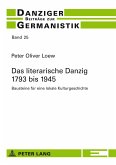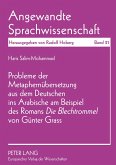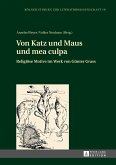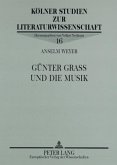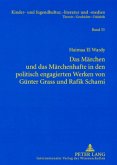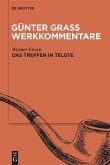This study extends the long-established notion of Grass's 'Danzig Trilogy' to that of the 'Danzig Quintet' - a literary project of epic proportions, which explores the evolution of Germany's relationship to its Nazi past over a period of forty years.
The interlocking stories of Die Blechtrommel (1959), Katz und Maus (1961), Hundejahre (1963), örtlich betäubt (1969) and Im Krebsgang (2002) are mediated by the memory and language of seven first-person narrators. Using the dual conceptualisation of memory developed by Freud and Lacan - 'reliving' versus 'recollecting' the past - the author shows how these narrators' accounts assert the reality of the Holocaust (as well as German wartime suffering), while highlighting the reluctance of ordinary Germans to admit their involvement in the Nazi regime.
This delineation of the complex relationship of three generations to their history is deepened by the intertextual nature of the quintet. Using the theory of Peter Brooks, Umberto Eco, Shoshana Felman and Hayden White, the study explores how Grass's textual strategies encourage the reader to view all five works as one overarching narrative, while simultaneously avoiding any literary or historical closure. In the process, the study places each book in the context of its moment of production, and also considers the implications of Grass's belated admission, in August 2006, that he served with the Waffen-SS during the final months of World War Two.
The interlocking stories of Die Blechtrommel (1959), Katz und Maus (1961), Hundejahre (1963), örtlich betäubt (1969) and Im Krebsgang (2002) are mediated by the memory and language of seven first-person narrators. Using the dual conceptualisation of memory developed by Freud and Lacan - 'reliving' versus 'recollecting' the past - the author shows how these narrators' accounts assert the reality of the Holocaust (as well as German wartime suffering), while highlighting the reluctance of ordinary Germans to admit their involvement in the Nazi regime.
This delineation of the complex relationship of three generations to their history is deepened by the intertextual nature of the quintet. Using the theory of Peter Brooks, Umberto Eco, Shoshana Felman and Hayden White, the study explores how Grass's textual strategies encourage the reader to view all five works as one overarching narrative, while simultaneously avoiding any literary or historical closure. In the process, the study places each book in the context of its moment of production, and also considers the implications of Grass's belated admission, in August 2006, that he served with the Waffen-SS during the final months of World War Two.
"Hall delivers...nuanced and insightful interpretations of the narratives, highlighting both their individual features...as well as their common bonds as part of the "Danzig Quintet". Hall's prose is jargon free, clear, and concise, and given the extent of secondary literature on these texts, one has to admire the scope and creativity of her work. (...) Hall's study is a welcome and highly valuable addition to Grass scholarship helping us to better understand the conflicted nature of his memory work." (Monika Shafi, German Studies Review)


